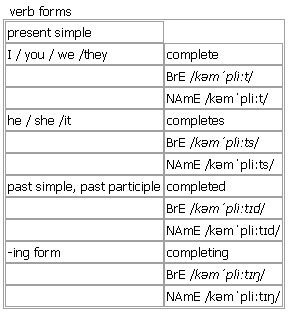|
Từ điển Oxford Advanced Learner 8th
 complete
complete

com·plete [complete completes completed completing] adjective, verb BrE [kəmˈpliːt] NAmE [kəmˈpliːt]
adjective
1. usually before noun used when you are emphasizing sth, to mean ‘to the greatest degree possible’
Syn: ↑total
• We were in complete agreement.
•a complete change
•in complete silence
•a complete stranger
• It came as a complete surprise.
•I felt a complete idiot.
2. including all the parts, etc. that are necessary; whole
• I've collected the complete set.
•a complete guide to events in Oxford
•the complete works of Tolstoy
• You will receive payment for each complete day that you work.
Opp: ↑incomplete
3. ~ with sth not before noun including sth as an extra part or feature
• The furniture comes complete with tools and instructions for assembly.
• The book, complete with CD, costs £35.
4. not before noun finished
• Work on the office building will be complete at the end of the year.
Opp: ↑incomplete
Word Origin:
late Middle English: from Old French complet or Latin completus, past participle of complere ‘fill up, finish, fulfil’, from com- (expressing intensive force) + plere ‘fill’.
Thesaurus:
complete adj.
1. usually before noun
•We were in complete agreement.
total • • outright • • utter • • perfect • • pure • • sheer • |informal positive • |especially spoken real • • absolute • |usually disapproving downright •
a/an complete/total/utter/real/absolute disaster
complete/total/utter/absolute/perfect/pure silence
complete/total/utter/absolute/pure/sheer nonsense
Complete or total? In most cases you can use either of these words, although total war is a fixed collocation that cannot be changed. Total is only used before a noun.
2.
•I collected the complete set.
whole • • entire • • full • • total •
Opp: incomplete
a/an complete/whole/entire/full day/set
the complete/whole/full truth/story
complete/full details
Example Bank:
•The book survives complete only in the second edition of 1533.
•The job is almost complete.
•You've made my life complete.
•a remarkably complete account of the negotiations
•A complete guide to events in Oxford is available from the office.
•After they had gone there was complete silence.
•He was a complete stranger to me.
•He was in complete command of the situation.
•I felt like a complete idiot.
•I've collected the complete set.
•It's a complete myth that he has royal blood.
•Refrigerators brought about a complete change in people's lifestyle.
•The accident caused the complete closure of the road.
•The play was a complete disaster from beginning to end.
•The train came to a complete standstill.
•The whole procedure has become a complete farce.
•The whole thing has been a complete waste of time.
•the complete works of Tolstoy.
Derived Word: ↑completeness
verb
1. often passive ~ sth to finish making or doing sth
• She's just completed a master's degree in Law.
• The project should be completed within a year.
2. ~ sth to write all the information you are asked for on a form
Syn: ↑fill in
•2 000 shoppers completed our questionnaire.
3. ~ sth to make sth whole or perfect
• I only need one more card to complete the set.
Verb forms: 
Word Origin:
late Middle English: from Old French complet or Latin completus, past participle of complere ‘fill up, finish, fulfil’, from com- (expressing intensive force) + plere ‘fill’.
Thesaurus:
complete verb T, often passive
•The project should be completed within a year.
finish • • follow (sth) through • |BrE round sth off • |AmE round sth out • |especially AmE, especially spoken be done • |especially business finalize • |informal, especially business sport wrap sth up •
complete/finish/finalize the preparations/arrangements
complete/finish/round off/round out/wrap up a/an discussion/evening/meal
complete/finalize/wrap up a deal
Complete or finish? Complete is more frequent in written English; finish is more frequent in spoken English. You can finish doing sth but you cannot complete doing sth:
•He hasn't finished speaking.
✗ He hasn't completed speaking.
Example Bank:
•Has the form been correctly completed?
•I've fully completed my training.
•The project has now been successfully completed.
•We have recently completed a 10-year study.
•Arrangements for the trip have now been completed.
•Complete the following sequence: 2, 3, 5, 13…
•Construction of the new road has now been successfully completed.
•He went to America to complete his education.
•It is unlikely that the repairs will be completed on time.
•She's just completed a master's degree in Law.
•When he has completed his studies, he'll travel the world.
•to complete a project/an assignment/a degree/a thesis/a deal/an apprenticeship
|
|
|
▼ Từ liên quan / Related words
Related search result for "complete"
|
|
